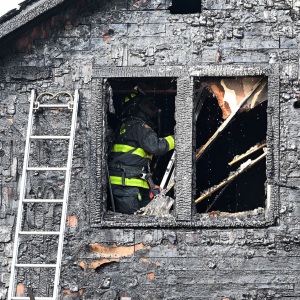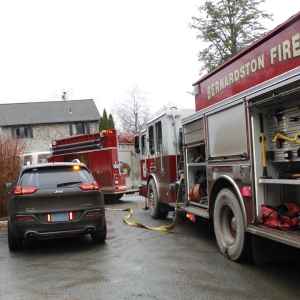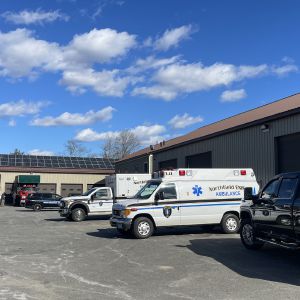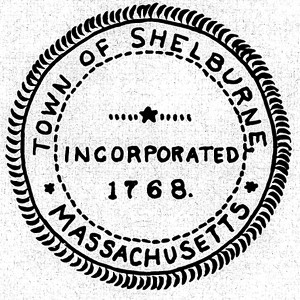My Turn: AG battery storage decision protects industry, not people

| Published: 11-25-2024 8:01 AM |
Last spring the town of Wendell submitted a general bylaw to the state attorney general regarding battery energy storage systems. For the second time in the past two years, the AG has rejected the will of our voters at Town Meeting.
In March of 2023, the AG said we did not “articulate” our public safety concerns about battery storage facilities. But this time, Andrea Campbell disapproved our citizen’s vote — and said nothing about our extensive documentation of the environmental risks and safety concerns regarding lithium-ion batteries.
The AG did not address our safety issues, which was the dominant purpose of our general bylaw. We submitted a general bylaw, but the AG said it had the “nature and effect” of a zoning bylaw, and we had to follow the “procedural” rules for adopting such a bylaw. The AG acknowledged that our Town Meeting vote was both an exercise of local police power (home rule) , and a legislative act, and carried a “strong presumption of validity.” Yet she disapproved the Town Meeting vote on mostly procedural issues.
For the past 39 years one sentence in state law (chapter 40A, s.3) has “protected” solar energy systems and “structures that facilitate the collection of solar energy” from being prohibited or unreasonably regulated” by local zoning bylaws — with one major exception: “except where necessary to protect the public health, safety or welfare.”
Here is the law protecting the solar industry from local zoning: Chapter 40A, s.3 — “No zoning ordinance or by-law shall prohibit or unreasonably regulate the installation of solar energy systems or the building of structures that facilitate the collection of solar energy, except where necessary to protect the public health, safety or welfare.”
The town of Wendell submitted evidence to the AG of two facts:
1. Battery storage systems are not specifically mentioned in state law anywhere as “structures that facilitate the collection of solar energy.” Batteries can only “absorb” whatever energy is fed into them, which can be dirty energy from fossil fuels, or cleaner electricity sources. Batteries by themselves have no photo-voltaic capacity to facilitate the collection of solar energy. These battery technologies were not even commercially in wide use in 1985, when this solar law was adopted.
2. Municipalities have the responsibility to protect the public health, safety and welfare of their residents. Our Selectboard submitted more than 60 pages documenting evidence of the safety risks caused by battery storage systems.
Article continues after...
Yesterday's Most Read Articles
 Two dogs, three cats killed in Orange fire
Two dogs, three cats killed in Orange fire
 Leyden house fire reignites on Monday
Leyden house fire reignites on Monday
 PHOTOS: Hundreds participate in ‘Hands Off!’ standouts across Franklin County
PHOTOS: Hundreds participate in ‘Hands Off!’ standouts across Franklin County
 Plans to move Northfield EMS to Bernardston property fall through
Plans to move Northfield EMS to Bernardston property fall through
 Shelburne Selectboard determines police detective will retain job
Shelburne Selectboard determines police detective will retain job
 Bulletin Board: Greenfield's Savannah Thomas wins Knights of Columbus Hoop Shoot state title
Bulletin Board: Greenfield's Savannah Thomas wins Knights of Columbus Hoop Shoot state title
Our proposed general bylaw did not totally prohibit battery energy storage systems as a land use. It allowed small and medium-sized installations, but prevented large scale battery uses — based not on any zone locations — but solely on scale. The commonwealth has done little thus far to address the issues of site suitability or fire suppression technology that communities must solve to prevent unreasonable risks to property and people. In fact, some of the reasonable regulations in our bylaw regarding avoidance of forested land and clear-cutting, or using available predeveloped and impervious sites, are similar to “site suitability” goals now being discussed on Beacon Hill. We believe that the town of Wendell, which is predominantly forested, is an unsuitable place for the siting of a large-scale battery storage system.
The bylaw that Wendell citizens overwhelmingly adopted at a May 1 Town Meeting is a general bylaw. We did not follow the state “procedure” for filing a zoning amendment because we were not filing a zoning amendment.
In a footnote, the AG states: “We make no determination as to whether the amendments would be found inconsistent with Chapter 40A, s. 3 … had the amendments been adopted in accordance with” procedures in the state’s Zoning Act. The AG has so “limited and narrowly applied” the safety exemption that it becomes impossible to reasonably regulate an unreasonably risky use, at an unreasonable scale. The AG cautioned: “If these extensive provisions were adopted as a zoning bylaw, and then used to deny a Battery Energy Storage System,” or make it “impracticable or uneconomical” to build a battery installation, it “may run a serious risk of violating Chapter 40 A, s. 3.”
We have raised legitimate municipal safety concerns. The state has done little to address these concerns. Even assuming our general bylaw was a zoning bylaw to the AG, the public safety exemption available in the Chapter 40A statute should have been allowed.
What good is home rule power if the state overrides it to protect an industry instead of protecting the safety of its constituents?
Court Dorsey, Laurel Facey, Anna Gyorgy, Nina Keller, Al Norman, Christopher Queen, Bill Stubblefield on behalf of No Assault and Batteries in Wendell (https://nabunited.org/).






 My Turn: ADUs and the politics of fear
My Turn: ADUs and the politics of fear My Turn: The war on us has begun
My Turn: The war on us has begun Jon Oltman: And the takeaway is?
Jon Oltman: And the takeaway is? Edward Schwerin: Trump regime not the answer
Edward Schwerin: Trump regime not the answer
